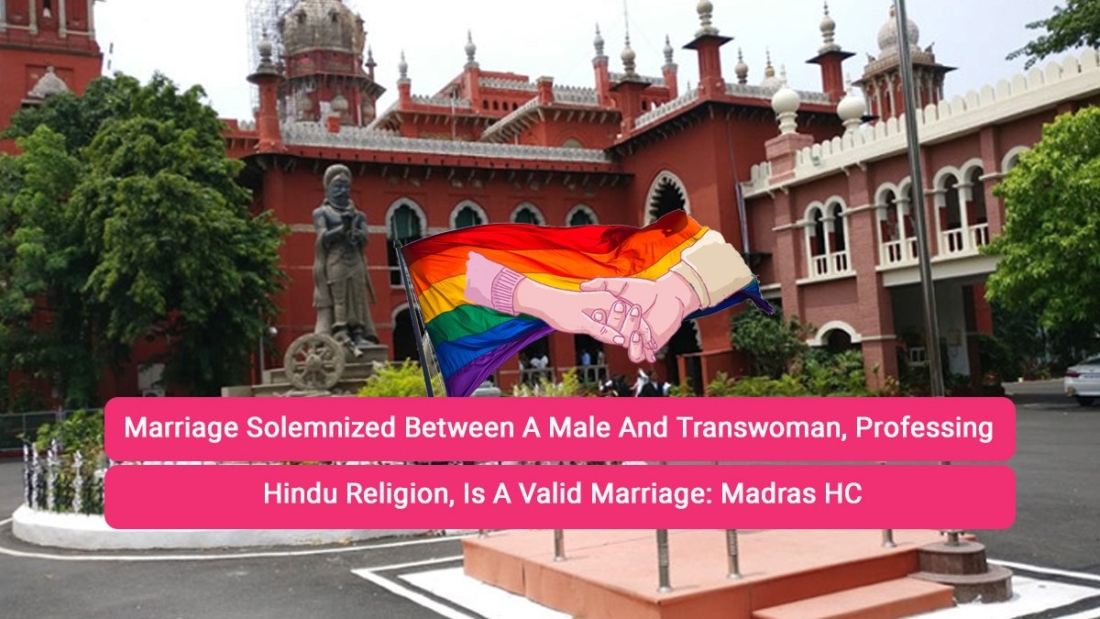A writ petition filed under Article 226 of the Constitution of India for issuing a Writ of Certiorarified Mandamus, to call for the records pertaining to the order of proceedings for Respondent 2 (Inspector General of Registration) and Respondent 3 (The District Registrar), and quash the same as illegal and consequently directing the respondents to register a marriage took place between a male and a transwoman.
Brief facts of the case:
- Petitioner 1, husband, and Petitioner 2, a transwoman wife, got married on 31.10.2018 at Arulmighu Sankara Rameswara Temple, Tuticorin, as per Hindu rituals.
- The village administrative officer certified that the marriage was in fact performed and it was not a bigamous one for either.
- When parties submitted memorandum of registration of marriage under Rules 5(1)(a) of the Tamil Nadu Registration of Marriage Rules in Form I before the Respondent 3, it was refused by him.
- Disagreeing with the said decision of Respondent 3, Petitioners files an appeal against it before Respondent 2.
- The Respondent 2 upheld the decision of the Respondent 3 and refused the appeal filed by the petitioners.
- Challenging the refusal to register their marriage, the petitioners filed the present writ petition.
Observations of the Court:
- Court referred to three landmark judgements of Hon’ble Supreme Court, namely, N.L.S.A. vs. Union of India 2014, Justice K.S. Puttaswamy vs. Union of India 2017 and Navtej Singh Johar vs. Union of India 2018, in which it was held that the transgender person has right to decide their self-identified gender. While referring to N.L.S.A. case, court highlighted the observation of Hon’ble Supreme Court, where it was noted that the existences of a third category outside the male-female binary has been recognized in the indigenous Hindu tradition and the right of the transgender person to marry was also recognized.
- Court also referred to the story of “Shikhandi”, an important character of great Hindu Mythology scripture “Mahabharata and textbook “Jaya” written by a renowned writer Devdutt Pattanaik based on great Mahabharata war. The story of encounter between Lord Rama and transgenders in another great Hindu Mythology scripture “Ramayana”, was quoted by the court.
- Taking leap from traditional Hindu mythology to modern neuroscience, court referred to a textbook “The Tell-Tale Brain” by Prof. V.S. Ramachandran and observed that sex and gender are not one and the same. A person’s sex is biologically determined at the time of birth but no in the case of gender. Court said in the present case, the petitioner 2 has herein has chosen to express her gender identity as that of a woman and this falls within the domain of her personal autonomy and involves her right to privacy and dignity.
- Court observed that both the petitioners profess Hindu religion and their right to practice Hindu religion is recognized under Article 25 of the Constitution of India. Court said that Hindu Marriage Act is a personal law of Hindus and in that case, when the right of the transgender persons to marry has been upheld by the Hon’ble Supreme court, it naturally, cannot be kept out of the purview of the Hindu marriage Act. The petitioner’s marriage was solemnized in a temple. Therefore, their fundamental right under Article 25 has been infringed.
- Court again referring to N.L.S.A. case said that the mandate issued by the Supreme Court against medical treatment of intersex infants and children, in which it was stated that no one shall be forced to undergo medical procedures as a requirement for legal recognition of their gender identity, is not being honored and directed the Government of Tamil Nadu to issue a Government order enshrining the mandate of Supreme Court to ban such medical treatments on intersex infants and children. Court also directed Respondent 4 (The Secretary to Government, Health and Family Welfare Department, Government of Tamil Nadu.) to file a compliance report before the Registry within a period of eight weeks from the date of a copy of this order.
- Court noted another aspect of the present matter that the Petitioner 1 is a Hindu Kuravan, a notified scheduled community and Petitioner 2 belongs to Saiva Vellalar community. The Government of India has introduced a scheme known as Dr. Ambedkar Scheme for Social Integration through Inter-Caste Marriages to encourage inter-caste marriages. Inter-caste marriages alone will ultimately lead to social integration and fulfill the preambular promise of fraternity. The petitioners are clearly entitled to get financial incentives as set out in the said scheme.
- Finally, court held that the fundamental rights of the Petitioner 2 guaranteed under Article 14, Article 19(1)(a), Article 21 and Article 25 of the Constitution of India have been infringed. The orders impugned in the present writ petition stand quashed. Court directed the Respondent 3 to register the marriage solemnized between the Petitioners. The writ petition was allowed.
Written by Vaishali Jain & Hamda Arfeen
 Cart is empty
Cart is empty 

